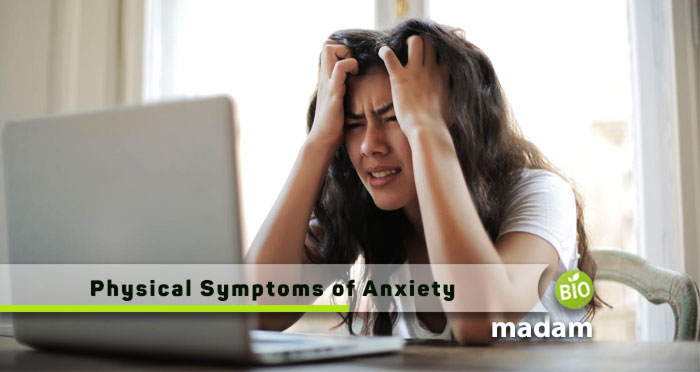Recently updated on March 7th, 2023 at 07:51 am
Anxiety has an adverse effect on a person’s physical and mental health. These can be short-term or long-term effects, clicking both the mind and the body of an anxious person. Most people take anxiety as a disorder that only affects mental health, which is valid to some extent. Few people are aware of the physical side effects of anxiety, where common symptoms are digestive issues, increased risk of infections, changes in the cardiovascular, Urinary, and Respiratory systems.
People occasionally feel anxiety, and this is normal. It is a normal part of life. However, how does anxiety last in you and repeated episodes of sudden and intense anxiety are points to ponder. Suppose feelings of anxiety are out of proportion to the actual danger and last longer. Then this is the time to seek help for a better life.
Common Symptoms of Anxiety
Signs of Anxiety and its symptoms vary from person to person. Every individual reaction to a situation is different. If you find four or more of the following symptoms in you, you must seek help to treat anxiety.
- Palpitations, pounding heart, or Rapid Heart Rate
- Sweating may increase
- Trembling, shading from anxiety or Muscle Twitching
- Sensations of Shortness of Breath or Smothering
- Feelings of Choking or Panic
- Chest Pain or Discomfort in Breathing
- Nausea, Gastrointestinal Problems, or Abdominal Distress
- Feeling dizzy, Unsteady, Lightheaded, Weakness, Lethargy, or Faint
- A Sensation of Chills or Heat
- Paresthesia (get numb or tingling sensations)
- De-realization (feelings of unreality and detachment) or Depersonalization (being detached from oneself)
- Fear of Losing Control over circumstances and one’s actions or “going crazy.”
- Fear of Dying or fear of sudden death
These symptoms have similarities with heart disease, thyroid problems, abnormal breathing patterns, and other illnesses. These panic attacks may make people visit emergency rooms.
Because they may believe that they are experiencing life-threatening health issues, or sometimes people ignore these alarming symptoms and put their lives in danger.

Physical Symptoms of Anxiety Disorder
Anxiety brings about both psychological and physical symptoms. It makes the body ready for a fight-or-flight moment. The brain activates body parts like the heart, lungs, and muscles for quick response to a threatening situation or anxiety trigger.
That is why you can observe a faster heartbeat, increased sweating, and muscle tension in an anxious person.
Although there are several types of anxiety disorders, looking at the physical symptoms gives a sense of what is possible. Long-term effects of anxiety on the body can increase the risk of developing chronic physical conditions. The medical community suspects amygdale is responsible for the development of anxiety. Amygdale, part of the brain, controls emotional responses.
When a person becomes anxious, his brain sends signals to the body to prepare it for the fight-or-flight response. The body releases neurotransmitters and hormones, including adrenaline and cortisol. These are also called stress hormones. When stress hormone levels increase for a longer time, it affects our body in many ways as mentioned below. But before that, check out this link helping you deal with stress.
Muscle Tension of the Back and Neck
Muscle tension is associated with normal anxiety. People with GAD, Generalized Anxiety Disorder, complain about unrelenting aches and pains in the shoulder, back, neck, jaw, tense legs, or grinding of the teeth.
These muscle tension manifestations do not subside in the absence of a threat. So it causes restlessness. Specific relaxation, medications that promote relaxation, or mindfulness skills are employed to get a better and healthy life.
Breathing and Respiratory Changes
During periods of anxiety, a person might face rapid breathing, resulting in a breathing issue called hyperventilation.
Hyperventilation is a state which allows the lungs to take in more oxygen and transport it around the body quickly. This way, extra oxygen helps the body prepare to fight or flee.
Hyperventilation may make people feel like they are not getting enough oxygen and may gasp for breath. In hyperventilation, people may feel:
- Dizziness
- Feeling fainted
- Lightheadedness
- Tingling
- Weakness
These symptoms fit into the description of a panic attack and GAD.
Effect on Cardiovascular System
Extreme Anxiety can cause a faster heart rate and blood flow throughout the body. It makes flee or flight response easy as increased blood flow brings oxygen and nutrients to the muscles.
Vasoconstriction is a condition in which blood vessels become narrow, affecting body temperature. People often feel hot flashes due to vasoconstriction.
In response, the body sweats profusely to cool down.
Some studies suggest that long-term anxiety may not be suitable for the cardiovascular system and heart health and may increase the risk of heart disease.
Digestive System Problems
Cortisol blocks nonessential body processes, and adrenalin blocks the digestion process in a fight-or-flight situation. This increase in levels of these hormones results in loss of appetite. And when people are feeling anxious, they may experience constipation, nausea, diarrhea, and a feeling that the stomach is churning. Constipation can be relieved by intake of dietary food, such as yogurt.
Digestive system problems can perpetuate worries about the presence of a medical illness and can have a particularly negative impact on day-to-day functioning.
Loss of Control over Urination
Anxiety can increase the need to urinate. This reaction is more common in people with phobias or phobic disorders.
Insomnia and Feeling of Being Tired
Chronic worry leads to insomnia. It disturbs the anxious person, either remaining restless or staying asleep. And when people cannot have proper sleep, they will be tired. It will harm the physical and psychological well-being of a person.

Conclusion
The prevalence of anxiety is high in the US. Physical symptoms are considered a manifestation of chronic stress. A medical and mental health provider must carefully evaluate the physical symptoms of anxiety.
They will evaluate the physical symptoms. They will check for any underlying medical conditions that may trigger the anxiety.
Long-term anxiety can be very distressing. It may increase the risk of physical illnesses and other mental health conditions, such as depression.
Fortunately, anxiety is treatable. Yes! You can enjoy a good quality of life with the help of psychological and medical interventions.

Hi, my name is Eva. I am currently practicing as a clinical social worker, that being my childhood desire. As a licensed therapist holding MPhil in Clinical Psychology, I am now on biomadam to provide the natives with the best family advice! Do you have any questions? See you in the comment section.

